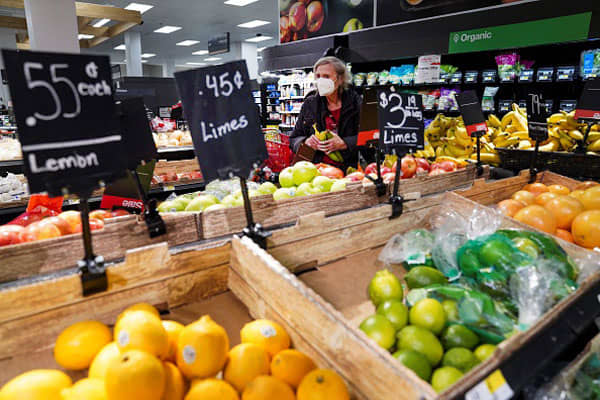Consumer prices in January surged more than expected over the past 12 months, indicating a worsening outlook for inflation and cementing the likelihood of substantial interest rate hikes this year.
The consumer price index, which measures the costs of dozens of everyday consumer goods, rose 7.5% compared to a year ago, the Labor Department reported Thursday.
That compared to Dow Jones estimates of 7.2% for the closely watched inflation gauge. It was the highest reading since February 1982.
Stripping out volatile gas and grocery costs, the CPI increased 6%, compared to the estimate of 5.9%. Core inflation rose at its fastest level since August 1982.
The monthly CPI rates also came in hotter than expected, with headline and core CPI both rising 0.6%, compared to the estimates for a 0.4% increase on both measures.
Stock market futures declined following the report, while government bond yields rose sharply. The benchmark 10-year Treasury note most recently yielded 1.97%.
On a percentage basis, fuel oil rose the most in January, surging 9.5% as part of a 46.5% year-over-year increase. Energy costs overall were up 0.9% for the month and 27% on the year.
Vehicle costs, which have been one of the biggest inflation contributors since it began surging higher in the spring of 2021, were flat for new models and up 1.5% for used cars and trucks in January. The two categories have posted respective increases of 12.2% and 40.5% over the past 12 months.
Shelter costs, which make up about one-third of the total CPI number, increased 0.3% on the month, which is the smallest gain since August 2021 and slightly below December’s increase. Still, the category is up 4.4% over the past year and could keep inflation readings elevated in the future.
Food costs jumped 0.9% for the month and are up 7% over the past year.
The burst in inflation has muted the sizeable earnings growth workers have seen. Real average hourly earnings rose just 0.1% for the month, as the 0.7% monthly gain in wages was almost completely wiped out by the 0.6% inflation gain.
A separate report Thursday showed that weekly jobless claims totaled 223,000 for the week ended Feb. 5, a decline of 16,000 from the previous week and below the 230,000 estimate. It was the lowest total since Jan. 1.
This is breaking news. Please check back here for updates.
